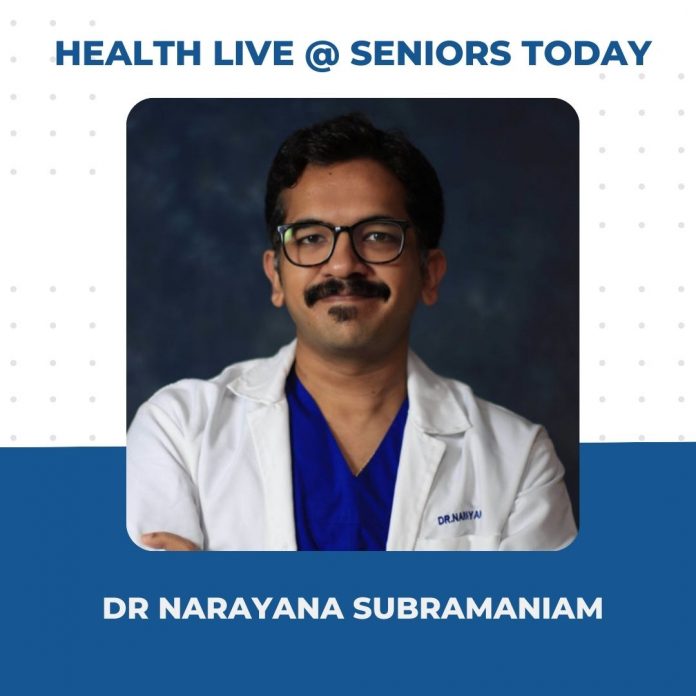On 26 March 2022, Seniors Today weekly Health Live Webinar hosted Dr Narayana Subramaniam who spoke about and answered questions on Oral Cancer. Marking April as the oral cancer month and using this opportunity to spread awareness and talk about the same.
A little about Dr Subramaniam:
Dr Narayana Subramaniam is Consultant and Head of Department, Head and Neck Oncology, Sri Shankara Cancer Hospital and Research Centre, Bengaluru. His medical qualifications are: MBBS MS (General Surgery) MRCSEd MCh (Head and Neck Oncology) FICRS. He received the TransOral Robotic Surgery Visiting Scholarship, University of Pennsylvania and the Fellowship, Sydney Head and Neck Cancer Institute.
Dr Subramaniam offers the whole range of treatment to patients with head and neck cancer, including innovative treatments like 3D virtually-planned dental implant-guided reconstruction of the jawbone and facial nerve reconstruction. With a team of experts, he is able to offer high-quality, affordable surgical and non-surgical care to patients with disorders of the head and neck, focused on quality of life.
He is also a clinician scientist, focused on improvements in existing head and neck cancer treatment. He is an investigator on multiple ongoing clinical trials and research, which offer innovative treatment options to patients with head and neck cancer. Through his collaboration with scientists and engineers, he is involved in the development of low-cost, technology-driven devices for cancer diagnosis and treatment. He has a passion for community outreach in oncology and public health, specifically targeting low-income households. With his insight into the confluence of medicine, technology, social impact and entrepreneurship, he is the Bengaluru chair of the All India Managers Association Young Leaders Council (https://ylc.aima.in/index.php) and the Oncology Mentor for the GE Indian Edison Accelerator Program Cohort 3 (startups.gehc.co). He also regularly contributes articles on health for the general public.
Dr Subramaniam comes from a family of accomplished musicians, his father being the accomplished violinist and composed Dr L Subramaniam.
India is considered the oral cancer capital of the world. We have nearly 150,000 new patients every year.
And this is because of tobacco use. 1 in 3 adults in India use tobacco in some form. Unfortunately a vast majority of oral cancers are associated with tobacco use and alcohol.
We have the smoking kind of tobacco which includes the cigars, cigarettes, bindis. And the smokeless kind of tobacco which is the chewing tobacco- pan, khaini, jarda and you also have snuff which is inhaled.
Oral cancer or mouth cancer is when we get tumours inside the mouth.
There are a lot of areas or subsites in the mouth. The tongue is the most commonly involved part. The lips, under the surface of the mouth/ floor of the mouth, gums, jaw bone, cheek are also parts of the mouth that can get involved.
Around 80% of oral cancer is because of tobacco use in some form. There is a misconception that people have to use tobacco for a long time for them to develop oral cancer such as 20, 30, 40 years or continuous use, but what we are seeing unfortunately is a much shorter duration of tobacco use is enough to give you cancer. And this is why we are seeing an explosion in the cases of individuals with oral cancer in the younger population; sometimes as young as 20 years.
One theory to explain this explosion is that it is being combined with multiple other harmful substances. Areca nut on its own causes cancer, when you add it with alcohol and tobacco it probably accelerates cancer. There is also snake-lime or what is called chunnam which also irritates the cheeks, tongue and causes chronic irritation and cancer.
There are however individuals who say that they have never touched tobacco or alcohol and still develop cancer- how does this happen? This can be because of other causes such as:
- chronic trauma- injury on the tongue, cheek/ lip from a sharp object such as a loose tooth or an ill fitting denture
- Immunosuppressant medications over a long period of time can cause oral cancer
- It can also be associated with HIV infection.
- Individuals who eat a lot of spicy foods
- Chronic mouth irritation
- Poor oral hygiene
Symptoms of oral cancer:
– White patch or red patches on the tongue, cheeks or the gums. These patches don’t go away even after you rub them. This is called leukoplakia. They can be flat, sometimes they can be elevated. If it persists for more than 2-3 weeks it is better to get it checked.
- Persistent ulcer or sore on the cheek, gum or tongue. These are usually painless in the initial stages and present with pain only in the later stages.
- Thickening on the lip/ cheek/ tongue
- Loosening of the teeth
- Swelling of the lymph nodes in the neck
How to get tested/ the investigations you can get done include:
- It is better to get yourself examined by an ENT specialist, oncologist, or someone who deals with or sees oral cancers on the regular since they can be a little tricky.
- Biopsy
- Scanning- CT or MRI scan. This will help us by telling us the size of the tumour, the location and involvement of the surrounding structures.
Treatment modalities:
- Surgery is the best treatment option to treat oral cancer. The cancerous area is removed along with a clear margin or a cuff of normal tissue.
- Reconstruction surgery to restore the functions of the mouth- swallowing, eating, talking and speech
- Grafting and scarless surgeries have come up with sophisticated equipment and medical advancements.
- All cancers are not curable, some of the diseases are too advanced but the treatment modalities we have available with us today, to ensure that the patient is comfortable and has a good quality of life








